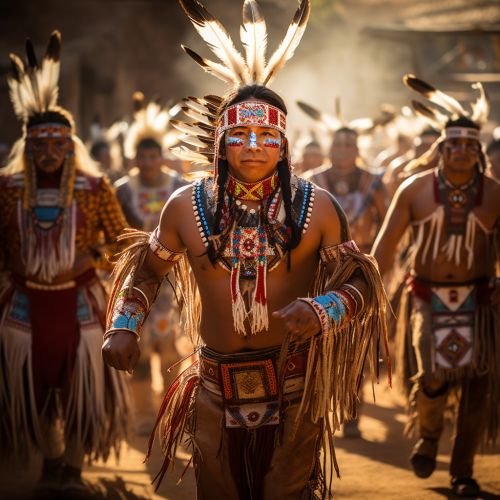Native Americans
Origins
The history of the Native Americans dates back thousands of years, from the first inhabitants of the Americas to the present day. The Paleo-Indians, the earliest known ancestors of the Native Americans, arrived in the Americas via the Bering Land Bridge, a landmass that once connected Siberia and Alaska. These early inhabitants migrated southward, populating the continents and forming distinct cultures and societies.


Cultures and Societies
Native American cultures and societies were diverse and complex, with each tribe having its own unique traditions, languages, and social structures. The Iroquois Confederacy, for instance, was a powerful alliance of five (later six) tribes in the northeastern United States. The Confederacy was known for its sophisticated political system, which influenced the formation of the United States Constitution.
In the Southwest, the Pueblo built impressive cliff dwellings and were skilled farmers, while the nomadic Plains Indians of the central United States were known for their horse culture and buffalo hunting practices. The Inuit of the Arctic, on the other hand, adapted to the harsh environment by developing advanced hunting techniques and tools.
European Contact and Colonization
The arrival of Europeans in the Americas during the late 15th century marked a significant turning point in Native American history. The Columbian Exchange, a period of cultural and biological exchanges between the New and Old Worlds, brought new technologies, ideas, and diseases to the Native American populations.
The Europeans, primarily the Spanish, English, and French, sought to colonize the Americas and exploit its resources, leading to conflicts with the Native Americans. The French and Indian War, for instance, was a major conflict involving Native American tribes, the British, and the French for control of North America.
Impact of European Colonization
European colonization had profound effects on the Native Americans. Diseases brought by the Europeans, such as smallpox, measles, and influenza, decimated Native American populations, who had no immunity to these new diseases. The colonization also led to the displacement and forced assimilation of many Native American tribes. The Trail of Tears is a notable example of forced removal, where thousands of Cherokee were forced to relocate from their ancestral lands, resulting in a significant loss of life.
Native Americans Today
Today, there are over five million Native Americans in the United States, belonging to 574 federally recognized tribes. Native Americans continue to face numerous challenges, including issues related to health, education, and economic development. However, they also continue to contribute significantly to American society and culture, preserving their rich heritage and traditions while also advocating for their rights and sovereignty.


